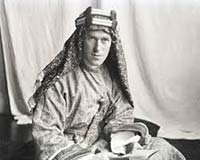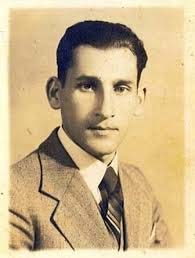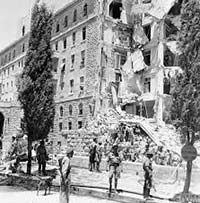Monday, 19 May 2025

The University of the Third Age meeting report
The Origins of the Arab - Israeli Conflict: The British in Palestine 1945-48
Speaker: Paul Atherton
The guest speaker at u3a Todmorden members meeting in May was Paul Atherton with 'The Origins of the Arab - Israeli Conflict: The British in Palestine 1945-48'.
The presentation originated from his writing course at Lancaster University, entitled 'Billy's War', which was about his fathers' experiences during and after World War Two. Paul would recount the history of Palestine also known these days as The Middle East.
He began by taking us back as far as the Roman Empire, and Pontius Pilate who, as the emperor, sentenced Christ to be executed. During Pilate's reign, Jewish people would be taken as slaves and removed from their original homes and scattered throughout the Middle East and beyond.
Further forward in history, another significant event led to more displacements – the crusades which lasted over 200 years. Richard I of England (the 'Lionheart') played a significant part in this event but was on the losing side, Saladin being victorious over the Christian armies. Subsequently, Jewish people were displaced, made to convert to the Islamic faith and, on a number of occasions, slaughtered.
Large numbers of Jewish people went north to other countries, particularly in Northeastern Europe, where they settled and carried on their traditions. But they continued to suffer more deaths through the eighteenth and nineteenth centuries, with a number of pogroms - organised massacres of particular ethnic groups.
At the start of the twentieth century, there was a marked trend of Jewish people returning to the lands from where they had originally fled, which was now known as Palestine. By 1917, the Jewish people began demanding to return to that area, as their own independent state. At this time, the Prime Minister of Britain was David Lloyd George. His Foreign Secretary was Lord Arthur Balfour, who supported that proposal, not least because, at this time, it was thought that Britain and their allies were in danger of losing WW1. Britain was also dependent on funds from the World Bank – who supported the demands of the Jewish people.
 Paul showed an image of someone familiar to most, if not all, of the audience – the late actor Peter O'Toole, in his role as Lawrence of Arabia. Paul described the real soldier as something of a maverick, but who was instrumental in the eventual defeat of the Ottoman Empire. Lawrence, as members would remember from the famous film, dressed in Arab clothing when conducting battles, and persuading different tribes to join forces and defeat the Ottomans. The Arabs believed that once that enemy had been defeated, the lands that they had occupied would be returned to them. But, as Paul explained, two eventually opposite sides had been promised what amounted to the same thing.
Paul showed an image of someone familiar to most, if not all, of the audience – the late actor Peter O'Toole, in his role as Lawrence of Arabia. Paul described the real soldier as something of a maverick, but who was instrumental in the eventual defeat of the Ottoman Empire. Lawrence, as members would remember from the famous film, dressed in Arab clothing when conducting battles, and persuading different tribes to join forces and defeat the Ottomans. The Arabs believed that once that enemy had been defeated, the lands that they had occupied would be returned to them. But, as Paul explained, two eventually opposite sides had been promised what amounted to the same thing.
After World War 2 ended, Jewish people, known as 'settlers', began to return to what was then Palestine. The British tried to limit the numbers of them returning quickly to an area which had begun to be known as Israel. Ships carrying settlers were sent to Cyprus, where they went to holding centres, or camps, to slow the numbers down. This was when the Atlee government was in power after the end of WW2 and trying to impose a limit of 1500 settlers per month arriving in Palestine. This couldn't work, and the camps became known as 'Bevan Belsen', referring to the British Foreign Secretary of the time. The effect of this was judged badly by Britain's allies such as the French, but even more so by the USA.
 Zionist, or Jewish, resistance to how Britain was dealing with the people who wanted to live in Israel had actually begun in 1928. Their leader was Avaram Stern (pictured left), appealing to other nations to help overcome the British Government in the next decade. He tried to get European nations to help, including the Nazi party in Germany. Stern didn't know about the plans Germany had, concerning the Jewish people in their country at this time. But his movement received weapons and other support from Benito Mussolini.
Zionist, or Jewish, resistance to how Britain was dealing with the people who wanted to live in Israel had actually begun in 1928. Their leader was Avaram Stern (pictured left), appealing to other nations to help overcome the British Government in the next decade. He tried to get European nations to help, including the Nazi party in Germany. Stern didn't know about the plans Germany had, concerning the Jewish people in their country at this time. But his movement received weapons and other support from Benito Mussolini.
 Stern was expected to be the first leader, even Prime Minister, of Israel, but he was killed in an ambush by British forces in the nineteen thirties. Resistance continued into the next decade, which saw one of the pivotal events in Israel's history – the bombing of Jerusalem's King David Hotel in 1946, pictured right. This resulted in over ninety deaths; 26 British, the remainder a mixture of Israelis and Arabs. The attack was carried out by another resistance group - the Irgun.
Stern was expected to be the first leader, even Prime Minister, of Israel, but he was killed in an ambush by British forces in the nineteen thirties. Resistance continued into the next decade, which saw one of the pivotal events in Israel's history – the bombing of Jerusalem's King David Hotel in 1946, pictured right. This resulted in over ninety deaths; 26 British, the remainder a mixture of Israelis and Arabs. The attack was carried out by another resistance group - the Irgun.
William Atherton joined the British Army in July 1942 by which time, Paul said, second world war events had gone catastrophically wrong for the British and that defeat was expected. Billy weighed exactly seven stones when he joined up – this may have been instrumental in him becoming a lorry driver – rather than a commando or similar. He would have started putting on weight no doubt when his small helpings of food when growing up were increased; his favourite things being Spam, corned beef and sardines.
Billy arrived in Palestine in 1946, which Paul described as a paradise, foodwise, compared to Britain at this time. Post war, the majority of people would not have tasted Oranges and other fruit for a long time, perhaps even never. Soldiers would have taken advantage of this, the cheapness and amount of fruit, and being able to send it home cheaply, would have gone down well with relatives. A similar bounty for the folks at home would be eggs sent back from Palestine as their ration of eggs was one egg per person per week.
But Billy didn't send any eggs back, Paul said, because of something he had encountered earlier in his service. Around the end of the war he was travelling through France with two tanks, and crews, when they reached an abandoned farm. There was a flock of hens still, which the soldiers thought might have laid eggs in the barn and went inside it to check. What they did find were twenty young men in German uniforms who, arms tied behind their backs, all had been shot in the head. Probably by the French Resistance, but who could say?
Billy's actual first choice of service in the war was to become a merchant seaman. In fact, he travelled to Liverpool to try and join a ship's crew but was rejected. Paul reflected on this, bearing in mind the many merchant ships which had been sunk by German u-boats – possibly a good escape for his father.
When Billy was serving in Palestine, the troops could enjoy the latest films, and one of them might have been 'The Killers' an American movie starring Ava Gardner. Among the stories recounted by Paul was that Billy frequented the King David Hotel and became friendly with a barmaid there, who was the very image of that film star. Sadly, the barmaid was one of the victims of the Irgun bombing in 1946.
This was near the end of a very interesting and absorbing presentation, even though there still seems to be no end in sight of the troubles in the Middle East.
Our audience showed their appreciation with enthusiastic applause for Paul's presentation.
Not yet a member? We're always delighted to welcome new members. Contact details: website at www.u3atod.org.uk or email at info@u3atod.org.uk.
Many thanks to Colin Sanson for this report
Previous U3A reports on the HebWeb - click here

